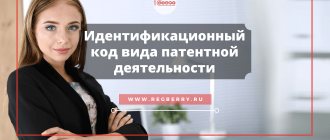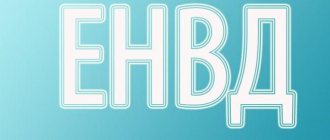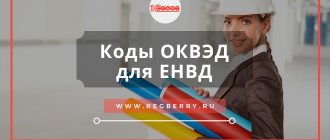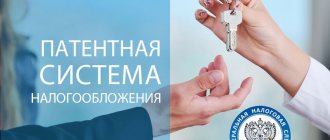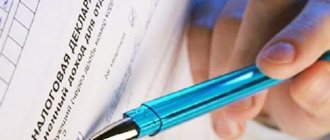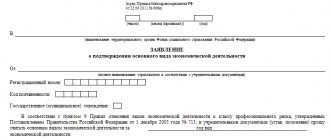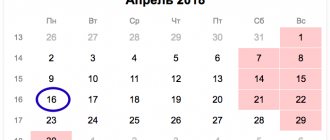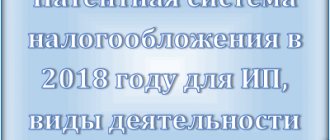When starting a business, every businessman must choose a taxation scheme. At the moment, both a general regime with payment of a standard tax and special regimes that provide preferential tax payments are available. One of these regimes involves obtaining a patent. But before choosing this form, you should find out whether the patent tax system for individual entrepreneurs in 2021 allows the types of activities (PSN) that the merchant plans to engage in.
The essence of the patent tax system
A patent is a special document that is issued for a specific type of activity and for a specific period. This tax scheme is available exclusively to individual entrepreneurs. You can purchase a permit for a period of one month to a year.
The conditions for obtaining a patent and switching to the appropriate taxation system are:
- Permission to use this scheme in the region where the entrepreneur operates.
- Compliance of the selected activities with the provisions of the Tax Code and regional legislation.
- Permissible number of employees.
- Receiving annual income from activities on the PSN within the limit.
- The area of the sales area or catering facility is up to 50 m2.
The types of activities that fall under the PSN may vary depending on the region. Accordingly, a patent can be obtained only for those of them that are permitted by the Tax Code of the Russian Federation and local regulations.
As for the number of employees, there are some nuances. To apply the patent regime, there is a limitation on the average number of employees hired. At the same time, the number of employees is not counted as a whole for the entrepreneur, but only in terms of doing business under a given tax regime. For example, if an individual entrepreneur combines PSN with UTII, only those employees who are engaged in patent activities are considered.
Important! The average number of employees is determined over the period of validity of the patent.
It is allowed to switch to a patent if the businessman’s income since the beginning of the year is below 60 million rubles. Income for each type of activity carried out under the patent system is taken into account.
Individual entrepreneurs are prohibited from using a patent when working under simple partnership agreements, as well as when concluding an agreement for trust management of property.
In case of violation of the listed conditions, the entrepreneur is obliged to switch to another regime before the expiration of the patent: simplified tax system, UTII, unified agricultural tax or general regime. This applies to exceeding the limit on income or number of employees. The form of settlements with consumers and the source of payment do not in any way affect the application of the special regime. On a patent, you can receive revenue in cash or non-cash form, including budget funds.
How to open an individual entrepreneur on PSN from scratch in 2021
If a citizen only plans to become an individual entrepreneur and work under the patent tax system, he has the right to submit two applications to the Federal Tax Service at the same time. This is possible only if he is registered in the same region where he plans to conduct his business. If the registration differs from the place of future work, you must first submit an application for assignment of individual entrepreneur status at the place of registration, and after receiving the certificate, you need to file an application for a patent in the municipality where the business will be conducted.
The scheme for obtaining individual entrepreneur status and permission consists of the following stages:
- Pay the state fee for registration as an individual entrepreneur.
- Fill out an application for assignment of individual entrepreneur status.
- Fill out an application to apply the patent tax system.
- Take your passport, TIN and the documents listed above and appear at the Federal Tax Service at the place of registration (provided that the place of residence by registration and the place of business are the same).
- Hand over the collected documentation to the inspector, receiving a receipt to this effect.
- On the designated day, appear to receive permission and a certificate of assignment of individual entrepreneur status.
Types of activities for PSN
One of the key conditions for the use of PSN is the compliance of the types of activities of the patent for individual entrepreneurs for 2021. Their list is in the Tax Code in paragraph 2 of Article 346.43. The list includes:
- repair of haberdashery and its tailoring (fur, sewing, textile and leather products, hats, knitwear, knitting);
- sewing, repairing, cleaning or painting shoes;
- cosmetic and hairdressing services;
- dry cleaning and laundry services;
- production or repair of metal products (keys, haberdashery, signs);
- repair work to restore the functionality of household appliances, radio electronics, watches;
- furniture repair;
- photo and film services;
- service and repair of motorcycles, vehicles;
- transportation of goods or passengers by motor transport;
- working with glass and mirrors (cutting, artistic processing, glazing);
- repair of buildings and residential premises;
- electrical installation, plumbing, welding work;
- tutoring, educational activities;
- looking after sick people and children;
- acceptance of glass containers and recyclables;
- veterinary services;
- construction activities.
This also includes the creation of handicrafts, as well as the leasing of land or buildings owned by the entrepreneur. There are quite a lot of such types of activities, and regional authorities are allowed to add to the list at their discretion.
Regulation of the use of codes
The patent taxation system (PTS) was introduced in the Russian Federation on January 1, 2013.
A little earlier, on December 14, 2012, anticipating the introduction of a new taxation system, the Order of the Federal Tax Service of the Russian Federation was issued and approved under the number MMV-7-3 / [email protected] on the introduction of the Classifier (KVPDP), which includes a complete list of types of activities Russian entrepreneurs to whom the patent system is applicable.
At the same time, changes and additions were made to the Tax Code of the Russian Federation, namely Art. 25.5 of the Tax Code of the Russian Federation, regulating the rules for the application of PSN. In accordance with this article, the right to use PSN is strictly limited by the status of the entrepreneur and the level of profitability of his activities. Thus, only individual entrepreneurs whose income from business activities does not exceed 60,000,000 rubles per year and whose type of activity is included in the list provided by the Classifier have the right to apply the patent system.
Also, the patent tax system has some territorial restrictions, namely:
- the use of a patent for an activity included in the Classifier is permissible only in the municipality that issued the patent;
- work under a patent outside the territorial entity is permitted only to individual entrepreneurs whose business activities are related to the provision of transportation and outbound trade services.
Codes and classifier
To determine the possibility of using PSN in relation to a certain area of work, you should study the list of identification codes for types of business activity of a patent, presented in a special classifier. The corresponding codes are indicated in the application for the use of a special regime by analogy with OKVED.
The type of business activity code for patent 2021 consists of 6 digits:
- The first ones indicate the type of activity according to the Tax Code.
- The following numbers are the code of the subject of the Russian Federation.
- Then comes the number assigned in a specific region to a specific type of activity.
For differentiated activities, several numbers are indicated, in other cases the numbering is 01. The classifier for each code contains a link to a regulatory act that allows the conduct of a particular activity in the selected region. Entrepreneurs on PSN who provide services to the public choose code 94.
How does the Federal Tax Service classifier for a patent compare with OKVED codes?
Since 2021, some changes have been made to the OKVED classifier: the codes of certain types of activities by industry have been clarified. For example, the encoding 01.12 (decoding - vegetable growing, gardening, etc.) was divided into 01.13 (vegetables, truffles and some other root crops), 01.25 (fruit trees), 01.30 (seedlings).
No changes were envisaged for the coding system under the patent tax regime. For 2017-2020, already approved classifiers by region are in effect. Individual coding consists of the following designations:
- serial number of the identifier;
- assigned region designation (for example, 74 - Chelyabinsk region);
- Direct designation of the industry for the patent.
Each region of the Russian Federation creates its own register of codes, which makes it easy to identify the area of activity of an individual entrepreneur, as well as control the payment of taxes and fees.
Attention! There is no connection between the OKVED and patent classifiers. The Tax Code of the Russian Federation does not oblige entrepreneurs on PSN to use a common coding system.
Do entrepreneurs in the patent regime need to use OKVED classification codes at all?
All-Russian and patent classifiers are used for various purposes. Similar systems are used not only in Russia, but in Belarus, Kazakhstan, Ukraine and other countries. The general encoding does not depend on the legal form of the business entity; the patent encoding is used only for individual entrepreneurs.
International classification will be required if the individual entrepreneur conducts operations not only in Russia
Main application tasks:
- tax planning and control;
- the ability to analyze the number and activities of legal entities and individual entrepreneurs within one state;
- collection of data for statistical purposes;
- unified designation of branches of activity (to avoid confusion in wording and purposes);
- simplification of the process of preparing documentation for enterprises.
A patent code will be required when opening a bank account, participating in tenders, and in other cases. In addition, the encoding affects the mode of collecting funds in favor of the state budget (as in the situation with a patent, for example). The use of the code determines the industry affiliation and the direction of activity that an individual entrepreneur can carry out on a patent.
What is the difficulty of classification
There is no publicly accessible link between the general type classifiers and the patent system. Chapter 26 of the Tax Code of the Russian Federation does not contain an obligation to use both code options. However, in practice, the modes are easier to use together.
All features and nuances of taxation are contained in the Tax Code of the Russian Federation
OKVED allows you to identify different types of activities. For example, hairdressing services are designated 96.02. In the patent system, an individual entrepreneur can carry out all types of work related to this group in the general classifier.
Attention! Explanations on this issue are contained in letters from the Federal Tax Service of the Russian Federation (SD-4-3/21857 dated 10.27.17) and the Ministry of Finance of the Russian Federation (03-11-12/72585 dated 03.11.17).
The procedure for obtaining a patent and its cost
To obtain a patent, you need to submit an application and go through the registration procedure. The transition to this regime is carried out voluntarily. The application should be submitted to the tax authority at the place of registration of the individual entrepreneur at least 10 days before the start of work under the new regime. In addition to personal submission of the document, it is allowed to transfer it through a representative, by e-mail or by a valuable letter containing an inventory of the attachment.
PDF file
Tax officials review applications for no more than five days. The validity period of a patent cannot exceed a calendar year, and transfer to the next year is prohibited. This means that you can obtain a patent in August for a maximum of 4 months. If an individual entrepreneur ceases its activities before the expiration of the PSN, the time of actual work in this mode is considered as the tax period.
The tax rate on PSN is 6%, but regional authorities have the right to adjust the figure downwards. Patent calculation for 2021 is made according to the formula:
Tax = (Base / 12 months × term) × 6%
- The base represents the potential income of a businessman. Its size is determined by the type of activity and the place where it is carried out.
- The term is the period of validity of the patent chosen by the entrepreneur.
When purchasing a trade patent for an individual entrepreneur for 2021 for a period of up to 6 months, the individual entrepreneur pays the entire amount one time until the patent expires. When purchasing for 6-12 months, a third of the amount is paid within 90 days from the date of receipt of the document, another two-thirds - before the expiration of its validity period. The actual income received does not affect the value of the patent.
The patent term is easy to extend. To do this, it is enough to submit an application to the tax authorities before December 20. In some regions, tax holidays are provided for beginning businessmen - the opportunity to work with a zero interest rate for a specified period. This benefit applies to certain types of activities.
Important! To calculate the cost of a patent, you can use an online calculator.
How much does a patent cost for an individual entrepreneur?
Before purchasing a permit, it is important to calculate its exact cost. Based on the data obtained, you can compare whether it is profitable to work under the PSN or whether it is easier to use another tax regime. One of the features of the patent system is the upfront payment of the cost of permission. The contribution amount is calculated not based on the actual income received, but on the potential income. The amount of expected revenue is determined by local legislation for each specific type of activity.
In addition to the expected income, other indicators influence the cost of the permit:
- validity period of the document;
- number of employees;
- number of vehicles;
- presence of several retail outlets.
Tax calculation procedure
The cost of a certain type of patent for an individual entrepreneur for 2021 depends on the basic income, the amount of which is calculated individually for each type of business in a particular region, as well as the calendar period for which the permit is issued. The annual tax rate is fixed at 6%. Based on this, the calculation formula will look like this:
- SP = BD x 6%, where;
- SP – patent cost;
- DB – basic profitability.
Provided that the individual entrepreneur acquires a permit for a period of less than one year, the result obtained is divided by 12 (the number of months in the year), and then multiplied by the required number of periods:
- SP = BD x 6% / 12 x KM, where;
- SP – patent cost;
- BD – basic profitability;
- KM – number of months.
Example:
A businessman from Moscow plans to repair shoes in 2021. The basic profitability according to the law is 660 thousand rubles. The cost of a permit for a year will be:
- 660,000 x 6% = 39,600 rub.
If the activity falling under the patent, the individual entrepreneur will be carried out for only 6 months, the result obtained must be divided by 12 and multiplied by 6:
- 39,600 / 12 x 6 = 19,800 rub.
If it is difficult to make the calculation yourself, you can use the online calculator located on the official portal of the Federal Tax Service. It can be used by any citizen who wants to obtain information about the cost of a patent, regardless of whether it is registered or not. The scheme of working with the calculator does not cause any particular difficulties and consists of filling out the following fields:
- Period. The calendar year in which the business is expected to be conducted is selected.
- Period of use. Here you enter the number of months per year during which the entrepreneur will work.
- Federal Tax Service. You must select the name of the tax office, for example, 77 - Moscow city.
- Municipality. The specific area in which the business will be conducted is determined.
- Kind of activity. From the list you must select the direction in which the merchant will work.
- Meaning. Filled in when selecting certain types of activities, for example, to indicate the number of trade objects, etc.
- Calculate. After filling out all the fields, you need to click the “Calculate” button, after which the program will issue the amount required for payment.
Example:
- How to cook lentils
- Japanese quince - benefits and harm. Planting and growing, care and propagation of quince chaenomeles with photos
- How to make a rose from a napkin with your own hands, photos and videos
An entrepreneur from Moscow plans to engage in rental services in 2018 for 7 months. Enter data:
- period – 2018;
- period of use – 07;
- Federal Tax Service - 77 - Moscow city;
- municipal formation - for example, Administration of the municipal formation of Tverskoy;
- type – rental services.
After clicking the “Calculate” button, information will appear on the screen that the cost of the patent for this period is 34,650 rubles, and the tax is paid in two parts:
- RUB 11,550 – within 90 calendar days from the date of issue of the patent;
- RUR 23,100 - until the permit expires.
Tax holidays
Russian legislation may establish a zero tax rate – tax holidays. A free patent is issued for a period of 2 years from the date of opening your own business, provided that:
- a citizen is registered as an individual entrepreneur for the first time;
- activities are carried out in the social, scientific and production spheres, including the provision of consumer services to the population.
Tax holidays are in effect until 2021. In addition, for merchants engaged in business in the Republic of Crimea and the city of Sevastopol, until 2021, the tax contribution rate for all types of commercial activities or individual positions can be reduced to 4% (instead of the legally established figure of 6%). Such a relaxation for individual entrepreneurs is recorded in the Tax Code of the Russian Federation - clause 2 of Art. 346.5.
Advantages and disadvantages of PSN
PSN gives an entrepreneur a number of advantages when working with both citizens and legal entities. One of the main advantages is the exemption from most taxes: on property used within this regime, personal income tax on income received under a patent, VAT on transactions related to this regime.
If a businessman combines PSN with another taxation scheme, activities under these regimes are subject to different taxes. When a patent is combined with the simplified tax system, compliance with the income limit is assessed based on all profits received under both special regimes.
The advantages also include:
- Relatively low patent cost.
- Possibility to choose the validity period.
- Possibility of acquiring several patents to work in different areas in selected regions.
- No tax reporting - only a declaration is submitted, which significantly saves time and nerves.
- Extensive list of activities.
Among the disadvantages of PSN are strict restrictions on the number of employees and the size of the sales floor. The patent has to be paid not based on the results of the activity, but during the period of its implementation. The cost of a patent cannot be reduced by paying insurance premiums.
Services for legal entities on a patent: violation of the principles of equality and legal certainty?
REPORT AT THE CONFERENCE “TAX LAW IN DECISIONS OF THE CONSTITUTIONAL COURT OF THE RUSSIAN FEDERATION”
Nefedeva Evgenia Aleksandrovna , lecturer at the Department of Constitutional, Administrative and Municipal Law, Buryat State University. Dorji Banzarova
The patent tax system (hereinafter referred to as PSN) was introduced into the Tax Code of the Russian Federation in 2013[1]. It refers to special tax regimes and is aimed at supporting the smallest entrepreneurs.
Over the seven years of existence of this taxation system, some arbitration judicial practice has developed. In turn, the Constitutional Court of the Russian Federation for the first time issued a resolution to consider the dispute on the merits, where the subject of consideration was the procedure for applying the PSN. The remaining decisions are represented by five refusal rulings of the Constitutional Court[2], the first of which was issued five years ago. This is also due to the fact that PSN is the youngest special tax regime in the Tax Code.
Therefore, the decision on the complaint of an entrepreneur from the Murmansk region [3] (hereinafter referred to as Resolution No. 22-P) can be called landmark. It demonstrates that not everything is so simple in the application of this special regime and the judicial practice of the highest authorities on it is only just beginning to take shape.
This fact is confirmed by the fact that already in the first three months after the introduction of the PSN, the Ministry of Finance of the Russian Federation (hereinafter referred to as the Ministry of Finance) managed to issue 11 letters of clarification. The main problem that was raised by entrepreneurs was the types of activities from the “household services” section of the now canceled All-Russian Classification of Services to the Population (hereinafter referred to as OKUN)[4] and their possibility of application in the provision of services on the PSN to legal entities.
We attempted to challenge these clarifications of the Ministry of Finance in the Supreme Arbitration Court of the Russian Federation in the manner of preliminary regulatory control. Then the judges issued a refusal ruling[5] on the lack of jurisdiction of this dispute to the court, but in its ruling the court indicated that the disputed letters do not meet the criteria allowing them to be recognized as normative legal acts, do not establish legal norms (rules of conduct) mandatory for an indefinite circle of people
In this article, we would like to draw the attention of readers to the fact that problems with the enforcement of the rules on PSN remain. After a significant period of time, it can be confidently stated that there is an urgent need for a constitutional and legal interpretation of certain provisions of Chapter 26.5 of the Tax Code.
Subjects of tax legal relations are forced to turn to tax principles precisely when the tax norm is so vague and so broadly interpreted that a certain basis (foundation) is needed that will keep the framework of its interpretation within the established generally accepted legal limits and will comply with the Constitution of the Russian Federation.
The first part of the Tax Code was introduced in 1999. As we know, the code was created on the legal positions of the Constitutional Court expressed earlier.
Therefore, we can safely say that Article 3 of the Tax Code is a kind of development of the constitutional principles of tax legislation, incorporating not only the provisions of Article 57 of the Constitution, but also the fundamental rights and freedoms set out in the first chapters of the Constitution.
In the resolution No. 22-P we are considering, the Constitutional Court bases its legal position on the following principles: equality and economic justification. But we would like to touch upon another principle in this article - the principle of legal certainty, which, it seems to us, is also inextricably linked with the previous principles.
I. Principle of equality (non-discrimination) and economic justification
So, the essence of the dispute was that, by introducing the PSN in the Murmansk region in relation to the type of activity “Renting out real estate objects,” the legislator did not define one of the key elements of taxation - the object, its physical indicator. It was not clear on what basis the tax should be calculated. Based on the number of real estate properties, based on the area of the property, or in general on the number of lease agreements concluded by the entrepreneur.
And the court in Resolution No. 22-P reliably notes that the owner of a shopping center who has leased several thousand square meters of space will pay hundreds of times less tax than an entrepreneur who rents out several apartments. In this case, the income of the first and the income of the second will differ by an order of magnitude.
As a result, the Constitutional Court expresses the following legal position: “ the absence in the contested norms of the Law of the Murmansk Region “On the Patent System of Taxation in the Murmansk Region” of criteria for determining objects (areas) as separate for the purpose of establishing the amount of potential annual income not only indicates a gap in legal regulation, but also leads , taking into account the law enforcement practice of filling this gap, to a violation of the principles of equality of taxation and the economic basis of the tax .”
Similar gaps and ambiguity in the rules appear before law enforcement officials when resolving another issue regarding PSN:
Is it possible to provide services to legal entities on PSN?
To do this, let’s take for consideration different versions of subclause 2 of clause 8 of Article 346.43 of the Tax Code (Table 1):
Table 1
| Until 2021 | From 2021 |
| 8. Subjects of the Russian Federation have the right: | 8. Subjects of the Russian Federation have the right: |
| 2) establish an additional list of types of business activities related to personal services in accordance with the All-Russian Classifier of Services to the Population, not specified in paragraph 2 of this article , in respect of which the patent taxation system is applied | 2) establish an additional list of types of business activities related to personal services and not specified in paragraph 2 of this article , in respect of which the patent tax system is applied. Codes of types of activities in accordance with the All-Russian Classifier of Types of Economic Activities and codes of services in accordance with the All-Russian Classifier of Products by Types of Economic Activities related to household services are determined by the Government of the Russian Federation ; |
So, if the taxpayer meets the criteria established by Chapter 26.5 of the Tax Code, namely:
- is an individual entrepreneur;
- does not have employees, or their number does not exceed 15 people;
- intends to carry out the types of activities established by the chapter on PSN, then he can safely apply to the tax authority to obtain a patent.
The main dispute that arises with the tax authorities about the legality of using PSN is the type of activity. The permitted types of activities, 63 of them, are directly listed in paragraph 2 of Article 346.43 of the Tax Code (hereinafter referred to as the Main List). Here, both the Ministry of Finance and the courts clearly agree that the types of activities can be used when providing services to legal entities.
And then, in paragraph 8 of Article 346.43 of the Tax Code, the legislator empowered the constituent entities of the Russian Federation to differentiate types of activities from the Main List (according to OKUN/OKVED) or introduce additional types of activities from the “household services” section according to OKUN (from 2021 OKVED2).
Based on the literal interpretation of subclause 2 of clause 8 of Article 346.43 of the Tax Code, subjects of the Russian Federation, in addition to the types of activities from the Main List, may additionally provide for PSN in relation to other types of activities if they are listed in the “household services” section of the OKUN Classifier. And here we are faced with a number of the following controversial legal issues.
1. There is no concept of “household services”
Nowhere in Chapter 26.5 of the Tax Code is there a concept of what “household services” are. We do not find this concept in the Civil Code of the Russian Federation, which the Ministry of Finance so readily refers to in its explanations on PSN.
The concept of “household services” was also not in OKUN itself. We find this concept only in Chapter 26.3 of the Tax Code of the Russian Federation, which regulates the special tax regime “Single tax on imputed income”. However, in Chapter 26.5, dedicated to PSN, there is not a single reference to the norms of Chapter 26.3 of the Tax Code, as well as the relationship with the specified special regime.
These are two different special modes, each using their own concepts. The concept of “household services” is absent in Chapter 26.5.
So, we find this concept exclusively in the chapter on UTII, Article 346.27 of the Tax Code, and until January 1, 2017, this concept sounded like this:
“household services are paid services provided to individuals (with the exception of pawnshop services and services for repair, maintenance and washing of vehicles), provided for by the All-Russian Classifier of Services to the Population, with the exception of services for the manufacture of furniture and the construction of individual houses .”
But even if we use the specified concept contained in Chapter 26.3 by analogy (since we do not find such a concept in any other laws) for PSN, then such activities as the production of furniture and the construction of houses are not a household service.
Back in 2009, in the arbitration practice of the Ural District in case No. A60-15313/2009, the arbitration courts of all three instances made an unequivocal conclusion that the production of furniture is not a household service and is rightfully excluded from the concept of household services from 01.01.2009 in the chapter on UTII.
The decision dated July 22, 2009 in case No. A60-15313/2009 states that “an analysis of the legal norms of the Code that related the manufacture of furniture to the provision of household services to the population allows us to conclude that there are uncertainties and ambiguities regarding the definition of this service in the legal sense for the purposes of taxation. This circumstance is due to the fact that, unlike such household services for the population, such as, for example, repair of household appliances, cleaning of premises, etc., that is, those services the result of which does not have a material expression, the manufacture of furniture is inextricably linked with the result itself - the product. In the latter case, it is impossible to determine the line where the work of making furniture ends and the product appears”[6].
This, in the opinion of the court, is evidenced by the fact that since 01/01/2009, in Article 346.27 of the Tax Code, which defines the concept of household services for tax purposes, it is separately stated that services, for example, for the manufacture of furniture, do not qualify as such. Those. in the understanding in which UTII could be applied, furniture manufacturing services and housing construction services were not classified as household services.
And 88% of disputes in arbitration courts as of July 31, 2019 were related specifically to the construction (repair) of housing and other buildings or the manufacture of furniture for legal entities.
2. Activity codes are ambiguous
Let us turn to the OKUN Classifier itself and the section “Household Services” or to the new OKVED2 codes, which by order of the Government of the Russian Federation were classified as household services[7].
The position of law enforcement agencies is that household services are household contract services provided exclusively to the population for household needs.
But in the OKVED codes classified as household services, one can find a lot of types of activities that, either in a literal interpretation or in their practical application in life, cannot be provided to the population. Let's list just a few of them:
table 2
| Activity code “household services” | Kind of activity |
| 33.12 | repair of machine tools, industrial refrigerators, construction equipment and equipment for the mining industry |
| 33.13 | repair and maintenance of measuring, testing and control equipment, group 26.5, such as: instruments for aircraft engines, equipment for testing automobile emissions, meteorological instruments |
| 41.20 | construction of all types of non-residential buildings, such as: buildings for industrial production, such as factories, workshops, factories, etc., hospitals, schools |
| 43.31 | restoration, conservation and recreation of plaster finishes on cultural heritage sites |
| 43.99 | rental of cranes and other construction equipment with an operator |
| 58.19 | publication (including interactive): catalogues, advertising materials |
| 74.10 | Industrial Design |
| 74.20 | photography activities for commercial purposes: photography for advertising, publishing, fashion magazines, real estate or tourism |
| 81.22 | cleaning of interior spaces in buildings of all types, including institutions, offices, factories, factories, shops, institutes and other commercial and professional establishments |
| 82.19 | photocopying and document preparation activities and other specialized support activities to support office activities |
This list of OKVED codes classified as “household services”, but not essentially them, can be continued endlessly. The conclusion suggests itself is that OKUN or OKVED are just classifiers, codes with the names of types of activities that are placed in certain sections or groupings. Their purpose is a statistical classification of economic activities in the European Economic Community. And to say that these services can be provided exclusively to the population for their domestic needs contradicts the laws of logic and indicates only a formal interpretation of the rules on PSN without searching for the real meaning laid down by the legislator.
3. Regulation of PSN at the regional level
At the regional level, the regulation of PSN is even more ambiguous. If we turn to the laws of some constituent entities of the Russian Federation, where the PSN was introduced, then in the wording of the laws we can see that the subject actually introduces an additional list of types of business activities related to household services.
Thus, Article 2 of the Law of the Sakhalin Region dated October 12, 2012 No. 93-ZO “On the patent taxation system in the Sakhalin Region” reads as follows:
“Establish an additional list of types of business activities related to household services and not specified in paragraph 2 of Article 346.43 of the Tax Code of the Russian Federation, in respect of which the patent taxation system is applied:
services for the preparation of documents and other services to support office activities ; copying and duplicating services for individual orders of the population; services for fireworks, light and sound shows; other cleaning and janitorial services not included in other groups; sweeping and snow removal services; services in the field of physical culture and health activities”[8].
That is, in the Sakhalin region, in addition to the types of activities that were established in the Main List of Activities in paragraph 2 of Article 346.46 of the Tax Code of the Russian Federation, an additional list of types of activities related to household services was also introduced.
Please pay attention to the first type of activity in this regional law: “document preparation services and other office support services.” What is an office? In the explanatory dictionary of S.I. Ozhegov "Office - office, stationery." Those. Translating this concept into modern language, an office is a company premises where papers are processed and clients are received. The type of activity that is included in the additional list is located and belongs to the section “household in connection with the complaint of citizen I.D. Ushakova".
[11] Resolution of the Constitutional Court of the Russian Federation dated February 20, 2001 No. 3-P “On the case of verifying the constitutionality of paragraphs of the second and third paragraph 2 of Article 7 of the Federal Law “On Value Added Tax” in connection with the complaint of the closed joint-stock company “Vostoknefteresurs”.
“services to legal entities on a patent”, “services to legal entities on the patent system”, “is it possible to provide services to legal entities on the PSN”
Patent reporting
If an entrepreneur works under several patents, he has to keep a book of income. This is necessary to calculate total earnings, which should not exceed 60 million rubles.
Businessmen on PSN who have entered into contracts with employees must provide reporting for calculating salaries and paying taxes on them. For this purpose, SZV-M is compiled monthly, and calculations of insurance premiums are made quarterly. You will also have to submit information on forms 6-NDFL, SZV-STOAZH and 2-NDFL.
Patent cost 2021
The patent price is calculated using the formula:
TAX = TAX BASE × 6%
The rate of 6 percent is the same for all businessmen. But constituent entities of the Russian Federation can set a zero rate for new entrepreneurs.
The Tax Code of the Russian Federation provides benefits for those entrepreneurs who are just starting their business and have chosen PSN for themselves (Article 346.50 of the Tax Code of the Russian Federation). To do this, regions can pass laws that provide 2-year tax holidays to new business owners.
Working with the Classifier
The patent system is a very convenient way of taxation, since it does not involve complex accounting calculations and the individual entrepreneur is exempt from:
- from taxes on personal income within 60 million rubles of potential income;
- from taxes on property of individuals on that part of the property of an individual entrepreneur that is used by him to conduct business activities under a patent.
- From VAT. An exception is the obligation to pay VAT: if, in addition to the patent type of activity, the individual entrepreneur conducts another type of activity that does not fall under the PSN, as well as in cases provided for in Art. 174.1 Tax Code of the Russian Federation.
The amount of the tax and the timing of its payment are established simultaneously with the issuance of the patent, that is, the tax is not related to the income of the entrepreneur, which means, in fact, the tax on the patent is an advance tax.
Thus, when choosing between PSN and other types of taxation, an individual entrepreneur should weigh both the pros and cons of PSN. We talked about the advantages above. As for the disadvantages, they include:
- the advance nature of the tax, since the individual entrepreneur at the time of the transition to the PSN does not yet know what income he will have and whether he will have any at all;
- impossibility of deducting insurance payments.
If the pros were able to outweigh the cons, then the next step would be to study the Classifier to identify in it the type of activity that the individual entrepreneur is engaged in or plans to engage in.
Despite its scary name, the Classifier of types of business activities for which the use of PSN is permissible is, in fact, a very logical and easy-to-use document.
It simply lists:
- types of business activities that an individual entrepreneur can engage in under a patent;
- codes of types of activities and links to the relevant norm of law that regulates this type of activity.
In order to switch to PSN, an individual entrepreneur must indicate in the application a six-digit digital code XX YY ZZ, in which:
- the first group of characters XX is the activity code;
- the second group of characters YY is the code of the subject of the Federation;
- the third group of characters ZZ is the serial number of the type of activity.
Groups of signs are distributed in accordance with subparagraphs of clause 2 of Article 346.43 of the Tax Code of the Russian Federation. So:
- the type of activity code (XX) consists of two digits from 01 to 99. The number 99 refers only to household services to the population (according to the OKUN classifier No. 163 of June 28, 1993) and is not included in Article 346.43, paragraph 2. The full list of codes is included in section 5 of the Classifier;
- codes of the subjects of the Federation (YY) are included in the Classifier in accordance with the Directory BG -3-13/149 of the Federal Tax Service of the Russian Federation dated March 25, 2002;
- the serial number of the type of activity (ZZ) is determined by the list of types of activity at the level of the subject of the Federation and represents differentiation from the numbers XX from 01 to 99. Do not be afraid of the word “differentiation”. We'll talk about it separately.
Territoriality and extraterritoriality of a patent
Conducting business activities in the territories of various constituent entities of the Russian Federation within the framework of a single type of activity involves the acquisition of a patent in each of the constituent entities.
For example, a patent for the repair of household appliances, obtained, say, in the Yaroslavl region, does not give the right to repair household appliances in a neighboring region, although the individual entrepreneur, in fact, will carry out in the neighboring region the same work for which he acquired the patent.
That is, if you assume a traveling nature of your work, then remember that you will have to purchase a patent in each of the subjects of the Federation in which you intend to work.
Work under a single patent in the territories of several subjects of the Federation is possible only for individual entrepreneurs whose activities are in one way or another related to the provision of transportation and outbound trade services.
Differentiation
Art. 346.43 of the Tax Code of the Russian Federation provides for the subjects of the Federation the right to set their own amount of the maximum income of an individual entrepreneur, giving him the right to work on a patent. At the Federation level, this maximum amount, as we have already said, is 60 million rubles. Since the cost of a patent is, in fact, the amount of tax, the right of subjects to set an income limit is just a local tax adjustment depending on the type of activity under the patent.
For the purpose of this regulation, the subjects of the Federation received the right to differentiate types of entrepreneurial activities (that same incomprehensible definition in the Classifier). Thus, all types of activities named in paragraph 2 of Art. 346.43 of the Tax Code of the Russian Federation (digits XX) can receive their values (digits ZZ) at the regional level.
Of course, differentiation is not carried out according to the personal desire of the head of the Federal Tax Service of a particular region. Differentiation must be justified by the provisions of one of the existing classifiers in the Russian Federation:
- services to the population - OKUN (Resolution of the State Standard of the Russian Federation No. 163 of June 28, 1993);
- types of economic activity - OKVED (Resolution 454-st of the State Standard of the Russian Federation of November 6, 2011).
Differentiation is also carried out based on the amount of expected income, which, in turn, can be calculated based on:
- average number of individual entrepreneurs' staff;
- area of real estate for rent;
- number of retail outlets with an area of more than 50 m2;
- number of non-stationary retail outlets, etc.
Actually, the methods and grounds for differentiation are not so important when using the Classifier. It is enough to know that differentiation is just an adaptation of activities established on a nationwide scale to the scale of a specific subject of the Federation.
In a purely applied sense, this means that when filling out an application in the fields reserved for the ZZ numbers, you indicate the regional number of the type of activity.
For greater clarity, let’s give a small example and take a type of activity such as services for leasing residential real estate in the city of Khimki, Moscow region.
In the code classifier, this type of rental activity and we see that rental is divided into two types - rental of residential premises has a digital designation according to scheme 195001, of which:
- 19 is XX, that is, the all-Russian activity code;
- 50 is YY, that is, the digital designation of the Moscow region;
- 02 is ZZ, that is, the number of the type of activity for the Moscow region.
